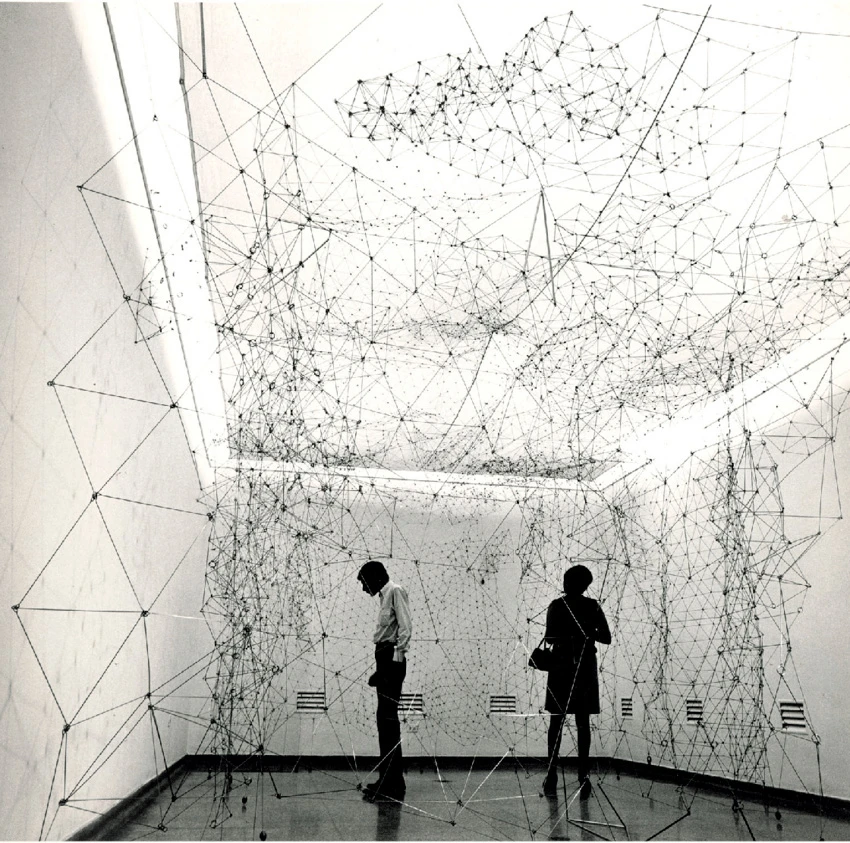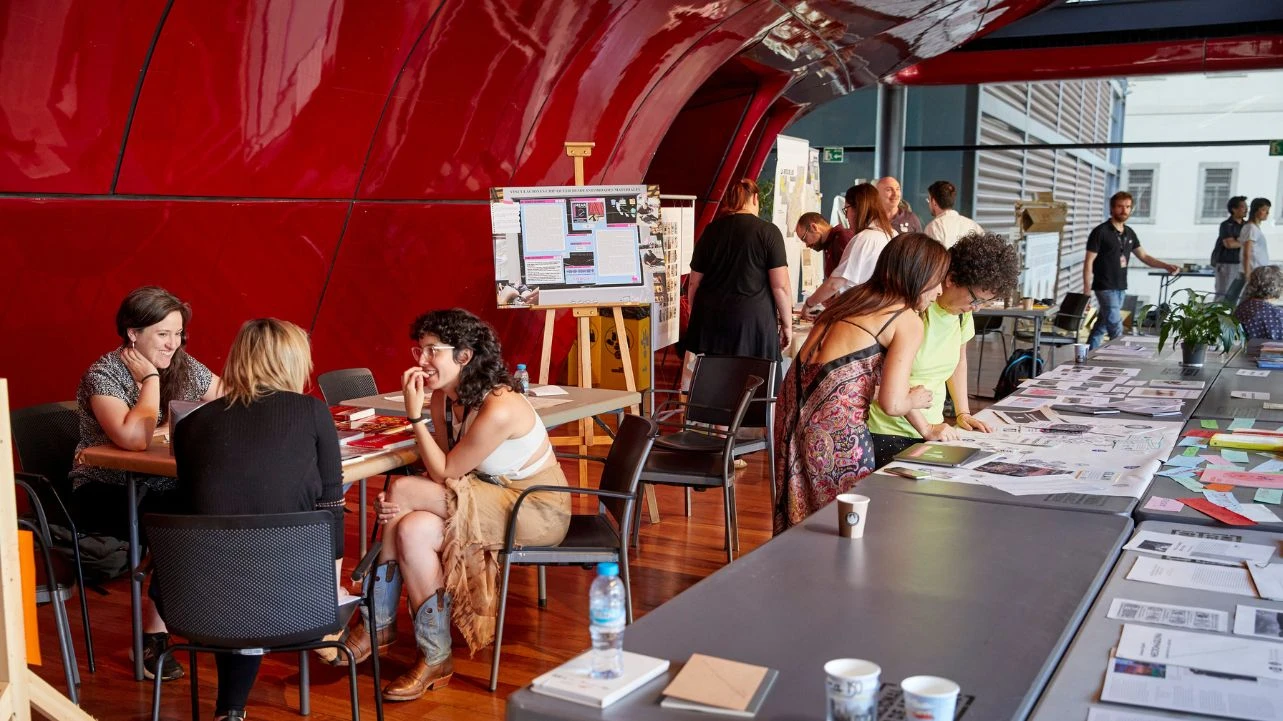Connective Tissue
The Museo Reina Sofía’s Study Programme in Critical Museology, Artistic Research Practices and Cultural Studies
The second edition of Connective Tissue, the Museo Reina Sofía’s Study Programme in Critical Museology, Artistic Research Practices and Cultural Studies, curated by Germán Labrador Méndez, will be held in 2024. The course aims to set out an advanced and experimental study plan, which runs for a year and culminates in students obtaining an Independent Qualification. Enrolment is free and the Programme is aimed at people with far-reaching interests in museology, artistic practice, humanities, critical theory, cultural management and political imagination. Through immersion in an educational research environment, it looks to strengthen multi-disciplinarity, commitment to research, procedural learning and didactic autonomy.
In the design of Connective Tissue, the Museo has activated an anatomic metaphor in reference to diverse organic tissue, the main role of which is to support and integrate, protect and structure, other tissues and organs. Connective tissue determines the form of bodies and their arrangement in spaces, and it is also the subject of growing attention in medicine and physiology. Its participation is critical in a broad range of connective, nutritional, therapeutic and mechanosensitive channels. To think of an educational research programme which “weaves the weaving of fibres”, with flexibility and a diverse specialisation, is to speak of an interdependent, situated and multi-distributed understanding of the role of a museum in the world and research taking place inside it.
Connective Tissue is the Museo Reina Sofía’s first training programme for researchers. It stems from the restructuring of its Study Centre and its interwoven research groups. The first edition was made up of two device types: 9 Seminars and 10 Critical Nodes.

This second edition comprises fifteen research seminars which put forward roadmaps of discussion and academic innovation in aspects which today are pivotal to humanistic and artistic knowledge, and are complemented with other activities from the Study Centre.
The Museo in its entirety offers participants in this Programme a space of dialogue and knowledge transfer that stretches beyond the traditional conception of teaching devices. As a result, students will develop their work in the course as Resident Student Researchers and, upon the conclusion of the Programme, will receive an Independent Qualification issued by the Museo Reina Sofía. The Programme will run for nine months: the first six months will primarily involve active participation in the Seminars and the remaining three the completion of a final project.
The Research Matter is based on the interconnection between fifteen annual research Seminars, articulated around monthly sessions lasting approximately three hours. The coordinators and initiators also make up a salient group of emerging researchers in their respective fields and disciplines. They will define the schedule, lines of work and the objectives of different seminars, with each working autonomously and porously in welcoming participants on the Museo Reina Sofía’s Study Programme and encouraging their involvement.
In this second edition, the Programme’s Resident Student Researchers must choose a minimum of eight seminars from those on offer, and must attend the methodological Proseminar sessions. If they wish, these researchers can increase their choices by up to a total of fifteen Seminars from the Research Matter.
In addition to regular attendance, Seminar participation entails reading and reflecting on materials and topics previously assigned to each session, and requires participants to actively refer to the guidelines and tasks assigned in each Seminar. The Programme coordinators will evaluate how well each Resident Student Researcher performs within each Seminar and dialogues will take place with those overseeing each one with a view to certifying students’ successful completion of the Programme.
Final Research Project and Successfully Completing the Programme
Each Resident Student Researcher is responsible for carrying out a Final Project, which can be freely chosen in both format and content. The said project will entail an academic thesis, an artwork, a curatorial project, some form of artistic production or the design of an institutional device, among other possible options. Moreover, the Final Project will always require support processes to be carried out at five successive junctures along the course: topic choice (until 15 March 2024), brainstorming (March 2024), a project presentation in different Seminars (until 1 June 2024), a project development presentation (during Conjunctions. The Study Centre’s Research Encounter, from 19 to 21 June 2024) and the final project defence (October 2024). Different committees, made up of some of the coordinators from the Seminars and Museo staff, will take part in support processes leading to students successfully completing the Programme.
After Resident Student Researchers have defended their final projects, they will receive an Independent Qualification in Critical Museology, Artistic Research Practices and Cultural Studies from the Museo Reina Sofía. The diploma will stipulate the Seminars studied, in addition to the title and subject matter of the final project.

Conjunctions 0. Encounter around the Study Centre’s Research Fabric, 2023, Museo Reina Sofía
Enrolment
Enrolment Procedure, Required Documentation and Admission Dates
Enrolment in the Museo Reina Sofía’s Study Programme is free. This second edition aims to welcome a group of no more than twenty-five Resident Student Researchers.
Applications must be sent via an enrolement form by 15 December 2023. Once this form has been completed, it must be sent with the documentation required to complete the process to the following email address: tejidosconjuntivos@museoreinasofia.es.
Document reviews and notification of acceptance will be carried out in order of receipt. Candidates chosen in the first selection process may be called in for a personal interview, either in-person or online. Rejected applications will go into a waiting list.
The aim is to form a diverse group in disciplinary and experiential terms, which means that candidates are welcome from any field and with different qualifications and different education and working backgrounds. On account of the Programme’s conception, the bulk of the Resident Student Researchers are likely to be made up of people embarking upon their professional, intellectual and/or artistic career, and those with some form of training and/or prior experience. Furthermore, the Museo strongly encourages people who express differences and forms of diversity in their artistic and research practices to apply.
The required documents are:
- Cover letter (2 pages): a key element for selection, where candidates must outline their interest in the Programme and explain how it ties in with their previous trajectory and future plans.
- CV (a maximum of 4 pages): this should include contact details and information on candidates’ educational background, their trajectory, contributions and other merits, as well as three names provided as references.
- A relevant sample of candidates’ work. This can be a PDF text (academic article, book chapter, project report) or a link to a website (art work, online documentary, portfolio, etc.).
- A record of academic, artistic and professional qualifications at undergraduate, graduate, and/or postgraduate levels.
Times, Spaces and Commitment
- The Museo Reina Sofía’s Study Programme requires strong and exacting commitment.
- The proper functioning of the Seminars is the responsibility of all Resident Student Researchers, and a repeated lack of application (unjustified absence, systematic deficiencies in preparation, and so on) will be regarded as a serious failure to meet the course obligations.
- Apart from exceptions highlighted in class times at the start of the course, most Seminars will be scheduled on weekday afternoons/evenings. Throughout the Programme, specific information will be provided on dates and times.
- In most cases, the Seminar sessions are in-person and take place inside the Museo Reina Sofía. However, some Seminars will adopt systems of online work or a combination of both formats. Eventually, work may be carried out in other spaces.
Description of the Study Centre’s Research Matter, 2024
Below are the complete programmes of each seminar and the final works of the Resident Researchers of each course:
Organised by
Museo Reina Sofía
Course type
In-person